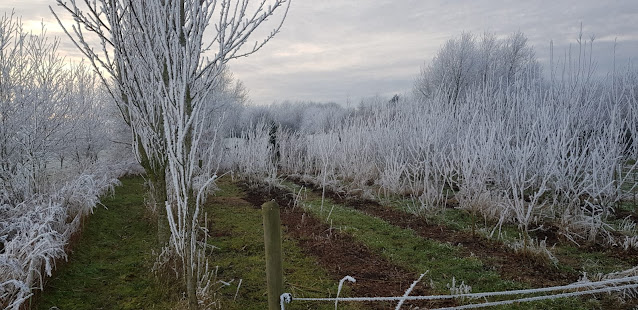Winter is the time to work on the trees on the smallholding. Deciduous trees are dormant which means they can be moved, planted, cut back and most of them can be pruned.
Coppicing and pollarding are ancient ways to manage trees. Coppicing just means cutting the tree right back to the base. How often you do this depends on the species of tree and what you want to use the coppiced wood for. It works because a developed root system puts all its energy into producing multiple fresh shoots from the coppiced stump. These grow straight up and uniform and are easy to harvest.
Pollarding is basically the same, but a trunk is left on the tree and the cutting back performed a few feet up. This is particularly useful where the young shoots might come under grazing pressure from rodents, anything from voles to rabbits.
 One type of tree which grows back particularly well is willow. Today I want to talk about my basket willows. These are species and varieties of willow chosen specifically for the colours of their stems and for producing multiple stems suitable for basket weaving.
One type of tree which grows back particularly well is willow. Today I want to talk about my basket willows. These are species and varieties of willow chosen specifically for the colours of their stems and for producing multiple stems suitable for basket weaving.Basket willows are cut back every year. Gradually a decent stump develops from which spring multiple stems every year. Growing them close together encourages the stems to reach for the sky. If not cut, the stems will branch in their second year, which is not what is needed for weaving.
Several years ago I purchased quite a few varieties of willow. These are purchased as pencil thick cuttings about 10 inches long. All you do is poke them into the ground and they should root.
A little extra care helps them settle in and grow stronger. They need protection from grass growth and may need some watering until they develop their root system. I underestimated the importance of this extra care so, in my weedy and windswept site, establishment has been slower than I would have liked. Most people plant through weed control fabric, but I have come to hate this stuff. It just deposits hundreds of long thin strands of plastic into the environment, eminently dangerous to wildlife. Instead I purchased some cheap fleece-like fabric, but it just didn't do the job and the weeds took over. I hoped that the chickens scratching about under the trees would help with this too, but they rarely go there and prefer to make a beeline for the veg patch whenever I accidentally leave the gate open.
As for watering, that's not going to happen. They are far too far from any convenient source of water.
I started with between 5 and 100 of each variety. Some did really well, others really struggled or even died out. Every year I cut them back and use what I've cut to make more cuttings, with the aim of multiplying the originals into long lines of maybe a hundred or so of each variety.
 |
| Cuttings taken from this year's growth are used to multiply the willows many fold. |
Over a few years the successful ones have grown stronger and stronger and now give excellent material for new cuttings. However, the drought of 2022 meant that almost without exception the cuttings from 2021 failed.
Anyhow, I feel that I am now getting somewhere.
The arrival of lorry loads of woodchip has helped. This is excellent as a weed-suppressant mulch and holds the moisture in the soil too.
So this last week I have been extending my basket willow holt. I have simply spread woodchip over the existing grass and then planted my cuttings straight into it.
I simply poke the cuttings (the right way round) into the ground, leaving them protruding so I can see where they are going. I then have the laborious and painful task of pushing them all down into the soil. Gardening gloves help, but it's still sore on the palm of the hand.
I've purchased several new varieties as well as replacing a couple of varieties that I had completely lost.
I have managed to harvest enough of some types to be useful for basket making, but for the moment I will still be reliant on using bought in willow for this. By next year I would very much hope to be producing enough for my own use.
I also intend to start selling cuttings of named varieties. I now have over twenty different varieties.







